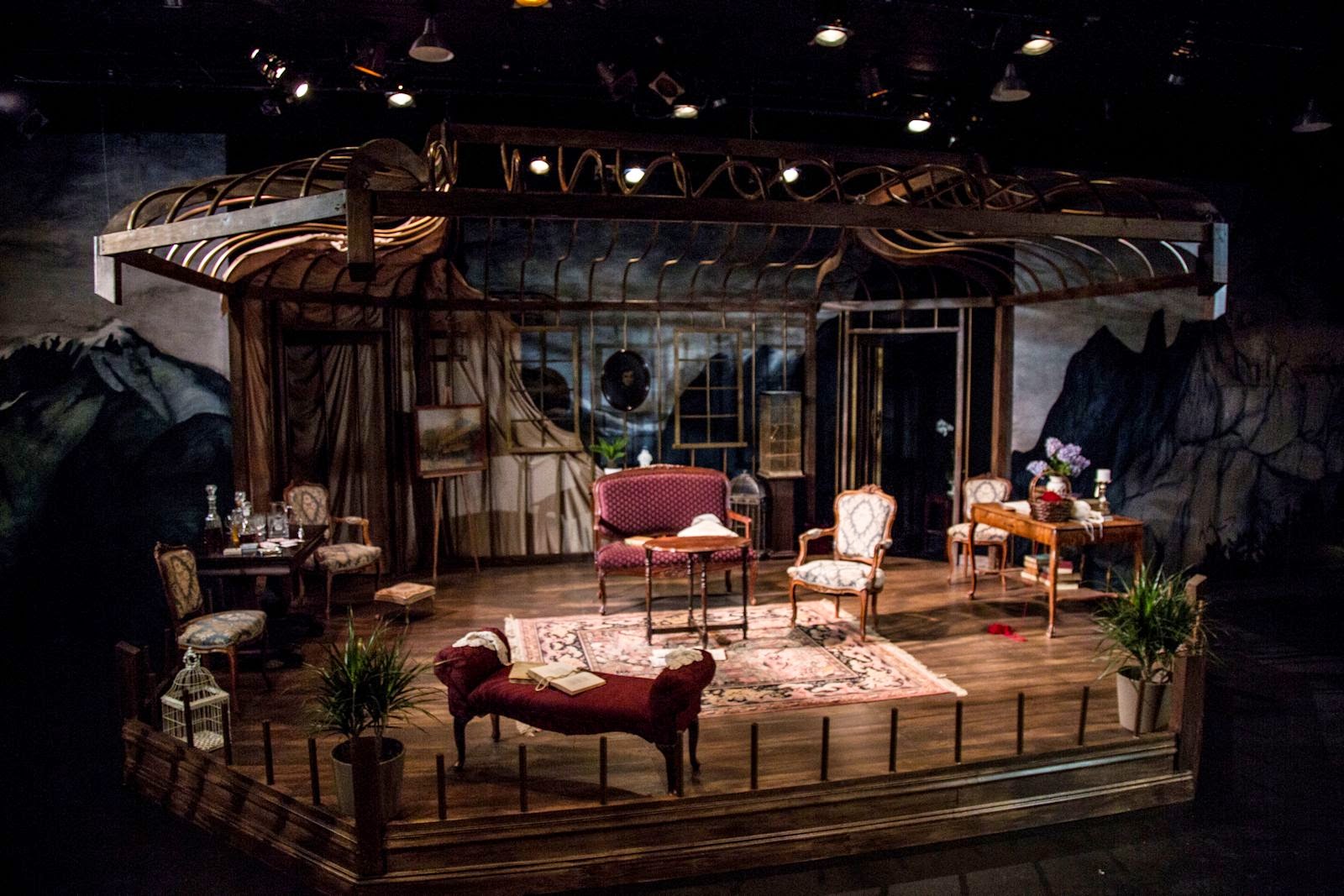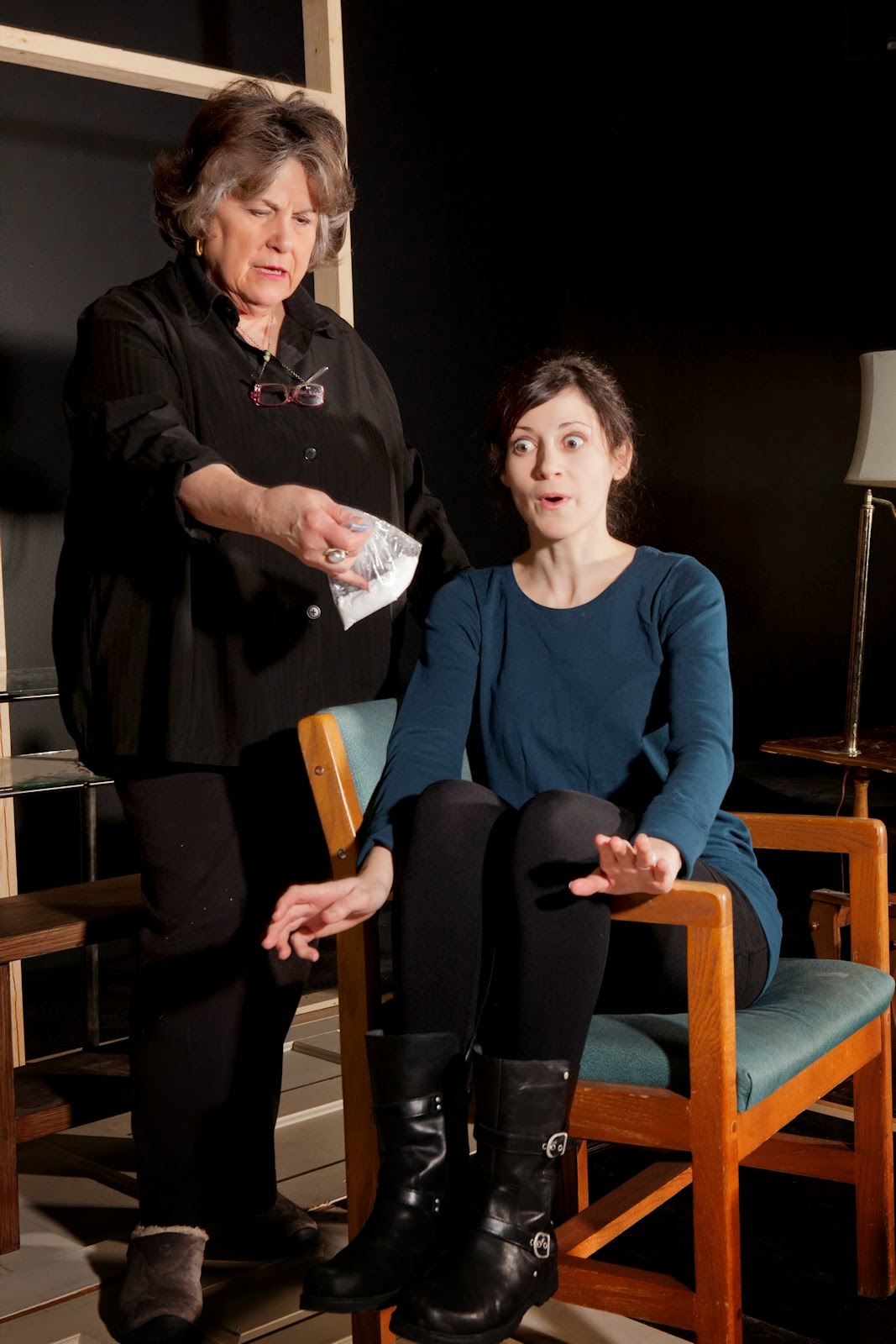Death And The Maiden - May 2012
The following article by Ariel Dorfman (playwright) was published 10/14/11 in "the guardian"
Death and the Maiden's haunting relevance
 The play I wrote 20 years ago about Chile's torture and trauma has a painful, global relevance today
The play I wrote 20 years ago about Chile's torture and trauma has a painful, global relevance today
It happened yesterday but it could well be today. A woman awaits the return of her husband as the sun goes down. The dictatorship that plagued her land has just fallen, and everything is uncertain. The woman is full of fear, gripped by a secret terror that she only shares with the man she loves. During the night and the day that follows she will have to confront that fear, she will bring to justice in her living room the doctor she believes is responsible for having tortured and raped her years ago. Her husband, a lawyer in charge of a commission investigating the deaths of thousands of dissidents under the previous regime, must defend the accused man because without the rule of law the transition to democracy will be compromised; if his wife kills that doctor, the husband will not be able to help heal a sick and wounded land.
Twenty years ago, when Death and the Maiden, the play that tells this story, opened in London at the Royal Court Upstairs, the country where that woman, Paulina, awaited a constantly delayed justice, was my own Chile or the Argentina where I was born. Or South Africa. Or Hungary. Or China. So many societies that back then were being torn by the question of what you do with the trauma of the past, how to live side by side with your enemies, how to judge those who had abused power without destroying the fabric of a reconciliation necessary to move forward.
Today, as the same play is revived in London's West End, its main drama is echoed in Egypt, Tunisia, Syria, Iran, Nigeria, Sudan, Ivory Coast, Iraq, Thailand, Zimbabwe and now Libya. In fact, because torture became widespread after the criminal attacks on New York on 9/11, because the most powerful nations in the world, and particularly the US, justified or were complicit in egregious abuses of human rights in order to make themselves feel safe, because they unleashed terror to fight and avenge terror, it could be ventured that the core dilemmas of Death and the Maiden are more relevant today than they ever were.
It was not something I had anticipated, this planetary weight and import, when I wrote the play in Santiago. My goals were far more modest. Returning to my country after 17 years in exile, I saw this work as my gift to its turbulent transition. The dictator was no longer in power, but his influence, his disciples, his corrupting shadow invaded every aspect of political life. Just as today in Egypt (or Russia, for that matter), those who had benefitted from decades of privileges and oppression continued to occupy enclaves from where they controlled the economy, the judiciary, the military, and threatened to return and murder and plunder and banish.
It seemed to me the obligation of a writer was to force the country to look at itself, at what all those years of mendacity and dread had wrought. Death and the Maiden plunged its finger into the wound of Chile by showing that the executioners were among us, smiling on the streets but also interrogated the democratic elite, wondering what ideals they had forced themselves to sacrifice. Neither did I let the victims off the hook. Paulina, the woman who had been raped and tortured and betrayed, was the most violent person on that stage, so the question for her was not any easier: are you going to perpetuate the cycle of terror, how can you forgive if the price they are demanding is that you forget? But one does not create such a transgressive play in a country still reeling from many years of pain without suffering the consequences oneself. The elite of Chile hated what I had done, reviled it.
But what my compatriots did not want for themselves was celebrated by the world. And now I have come back to London, and my characters have returned to the city that embraced them when they were as homeless as I was.
I'm thrilled that Death and the Maiden has not aged over these 20 years, that it still moves people to tears, confronts them with a tragedy that has no clear solution, that it speaks to our world today with the same passion it embodied yesterday. I'm thrilled that the relations between men and women that I explored, the intricacies of memory and madness, the aftermath of violence, the uncertainty of truth and narrative, continue to capture the imagination of so many. Thrilled, yes, but it is also sobering to realise that humanity has not managed to learn from the past, that torture has not been abolished, that justice is so rarely served, that censorship prevails, that the hopes of a democratic revolution can be gutted and distorted and warped.
I can't help but ask if 20 years from now I will be writing this phrase all over again: this story happened yesterday, but it could well be today.
Death and the Maiden's haunting relevance
 The play I wrote 20 years ago about Chile's torture and trauma has a painful, global relevance today
The play I wrote 20 years ago about Chile's torture and trauma has a painful, global relevance todayIt happened yesterday but it could well be today. A woman awaits the return of her husband as the sun goes down. The dictatorship that plagued her land has just fallen, and everything is uncertain. The woman is full of fear, gripped by a secret terror that she only shares with the man she loves. During the night and the day that follows she will have to confront that fear, she will bring to justice in her living room the doctor she believes is responsible for having tortured and raped her years ago. Her husband, a lawyer in charge of a commission investigating the deaths of thousands of dissidents under the previous regime, must defend the accused man because without the rule of law the transition to democracy will be compromised; if his wife kills that doctor, the husband will not be able to help heal a sick and wounded land.
Twenty years ago, when Death and the Maiden, the play that tells this story, opened in London at the Royal Court Upstairs, the country where that woman, Paulina, awaited a constantly delayed justice, was my own Chile or the Argentina where I was born. Or South Africa. Or Hungary. Or China. So many societies that back then were being torn by the question of what you do with the trauma of the past, how to live side by side with your enemies, how to judge those who had abused power without destroying the fabric of a reconciliation necessary to move forward.
Today, as the same play is revived in London's West End, its main drama is echoed in Egypt, Tunisia, Syria, Iran, Nigeria, Sudan, Ivory Coast, Iraq, Thailand, Zimbabwe and now Libya. In fact, because torture became widespread after the criminal attacks on New York on 9/11, because the most powerful nations in the world, and particularly the US, justified or were complicit in egregious abuses of human rights in order to make themselves feel safe, because they unleashed terror to fight and avenge terror, it could be ventured that the core dilemmas of Death and the Maiden are more relevant today than they ever were.
It was not something I had anticipated, this planetary weight and import, when I wrote the play in Santiago. My goals were far more modest. Returning to my country after 17 years in exile, I saw this work as my gift to its turbulent transition. The dictator was no longer in power, but his influence, his disciples, his corrupting shadow invaded every aspect of political life. Just as today in Egypt (or Russia, for that matter), those who had benefitted from decades of privileges and oppression continued to occupy enclaves from where they controlled the economy, the judiciary, the military, and threatened to return and murder and plunder and banish.
It seemed to me the obligation of a writer was to force the country to look at itself, at what all those years of mendacity and dread had wrought. Death and the Maiden plunged its finger into the wound of Chile by showing that the executioners were among us, smiling on the streets but also interrogated the democratic elite, wondering what ideals they had forced themselves to sacrifice. Neither did I let the victims off the hook. Paulina, the woman who had been raped and tortured and betrayed, was the most violent person on that stage, so the question for her was not any easier: are you going to perpetuate the cycle of terror, how can you forgive if the price they are demanding is that you forget? But one does not create such a transgressive play in a country still reeling from many years of pain without suffering the consequences oneself. The elite of Chile hated what I had done, reviled it.
But what my compatriots did not want for themselves was celebrated by the world. And now I have come back to London, and my characters have returned to the city that embraced them when they were as homeless as I was.
I'm thrilled that Death and the Maiden has not aged over these 20 years, that it still moves people to tears, confronts them with a tragedy that has no clear solution, that it speaks to our world today with the same passion it embodied yesterday. I'm thrilled that the relations between men and women that I explored, the intricacies of memory and madness, the aftermath of violence, the uncertainty of truth and narrative, continue to capture the imagination of so many. Thrilled, yes, but it is also sobering to realise that humanity has not managed to learn from the past, that torture has not been abolished, that justice is so rarely served, that censorship prevails, that the hopes of a democratic revolution can be gutted and distorted and warped.
I can't help but ask if 20 years from now I will be writing this phrase all over again: this story happened yesterday, but it could well be today.



Comments
Post a Comment